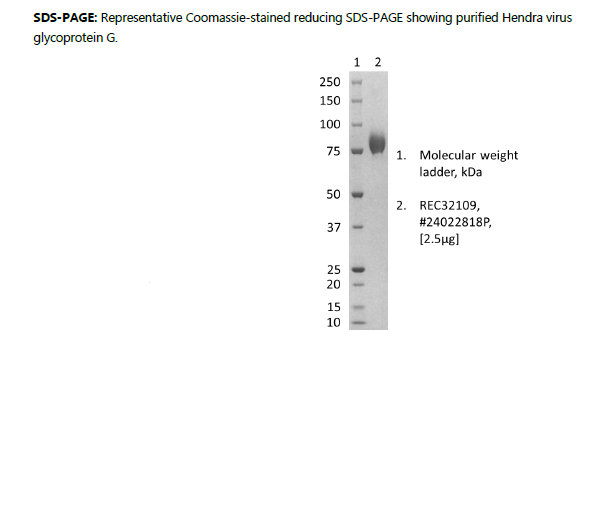Hendra virus glycoprotein G
Price range: $524.21 through $2,227.90 excl. VAT
Henrda virus (Henipavirus hendrensae) glycoprotein G (gG), expressed as sheep IgG Fc fusion protein. The Fc-tag has been removed by proteolytic cleavage of the fusion protein.
Hendra virus glycoprotein G
Henrda virus (Henipavirus hendrensae) glycoprotein G (gG), expressed as sheep IgG Fc fusion protein. The Fc-tag has been removed by proteolytic cleavage of the fusion protein.
PRODUCT DETAILS – Hendra virus glycoprotein G
- Recombinant Hendra virus glycoprotein G produced from HEK293 cells (NCBI Accession Number: AEQ38026.1).
- Strain/Isolate: HeV/Australia/Bat/2009/Yeppoon Y47a
- Untagged
- Presented as liquid in DPBS buffer
BACKGROUND
Hendra virus (HeV) is a rare zoonotic disease mainly found in Australia and associated with fruit bats of the Pteropus genus. It poses a severe threat to both horses and humans, often resulting in fatal outcomes. The first recorded outbreak of Hendra virus occurred in 1994 in Hendra, Australia, and since then, around 53 incidents have been reported, involving over 70 horses. Most cases are clustered along the northeastern coast of Australia, with seven documented instances of human infection, primarily through close contact with infected horses (WHO, 2024).
Transmission to humans occurs through exposure to bodily fluids or tissues of infected horses, leading to respiratory illness with flu-like symptoms. In severe cases, the infection may progress to encephalitis. Despite its rarity, with only seven confirmed human cases, the mortality rate remains high at 57%. Horses, in turn, contract the virus through contact with infected flying foxes’ urine, droppings, or saliva. However, human-to-human transmission has not been documented (CDC, 2022).
Pteropid bats, including fruit bats, are natural reservoirs for various zoonotic viruses like Nipah and Ebola. Equivac HeV, produced by Zoetis in Parkville, Victoria, Australia, is the sole commercially available vaccine for horses against Hendra virus. However, there is currently no vaccine available for humans (Wang et al., 2023).
References
- WHO (2024) Hendra virus infection, World Health Organization.
- CDC (2022) Hendra virus disease, Centers for Disease Control and Prevention.
- Wang, X., Wise, J.C. and Stewart, A.J. (2023) ‘Hendra virus’, Veterinary Clinics of North America: Equine Practice, 39(1), pp. 89–98.


